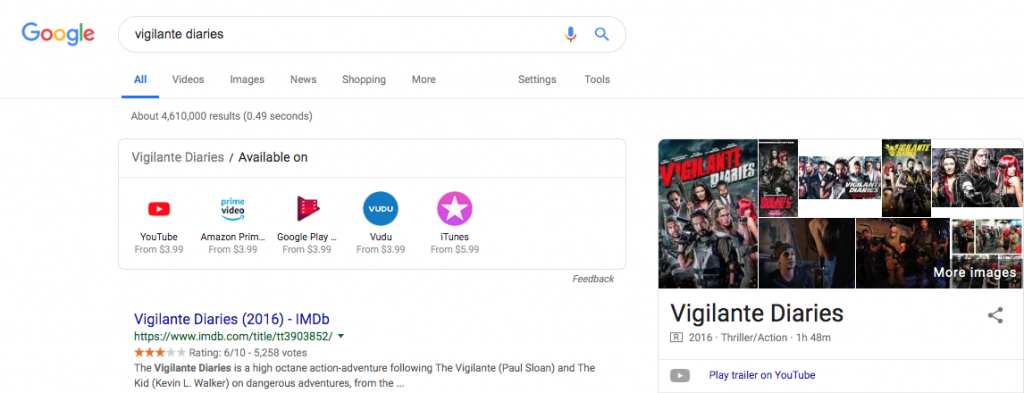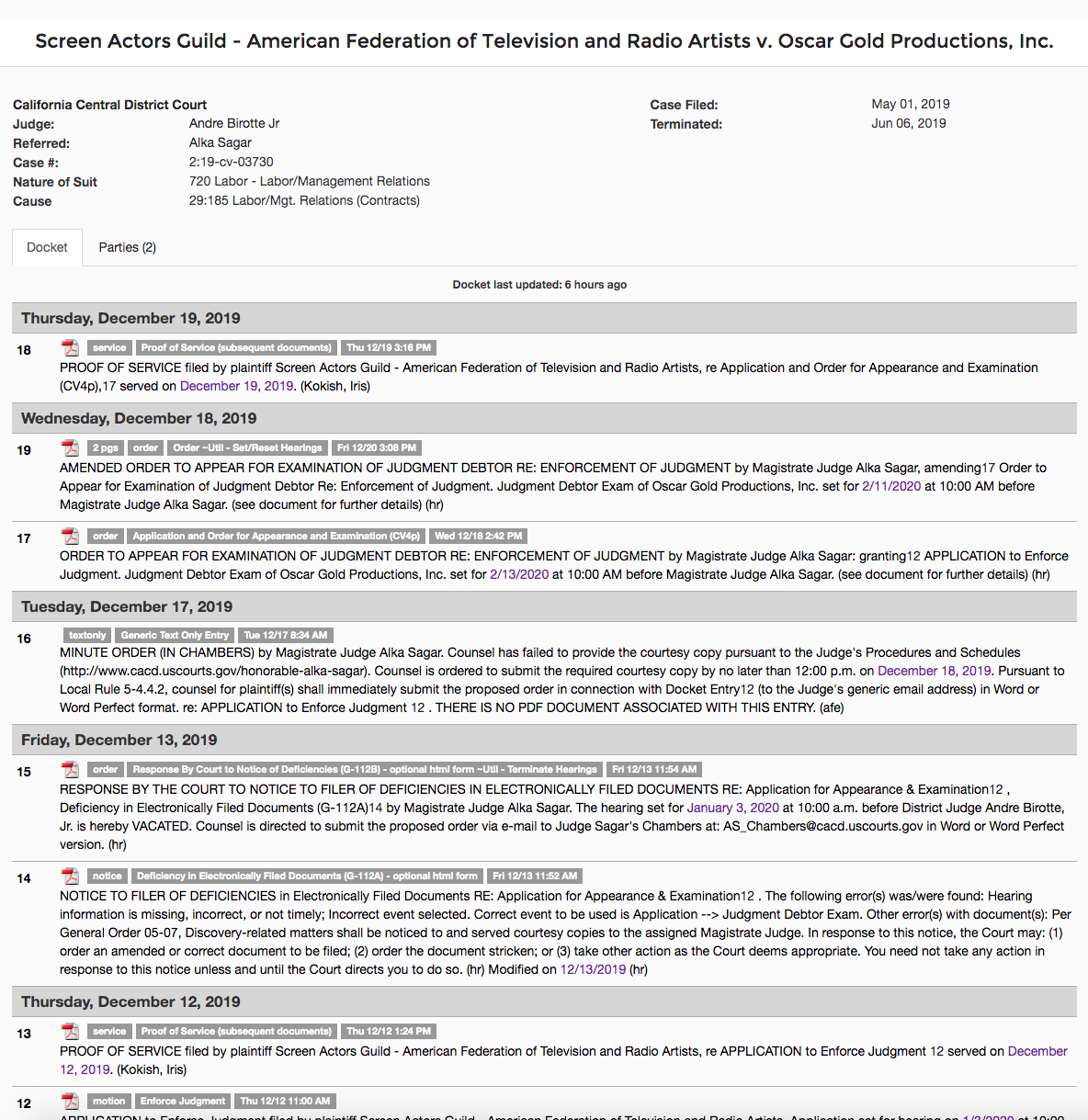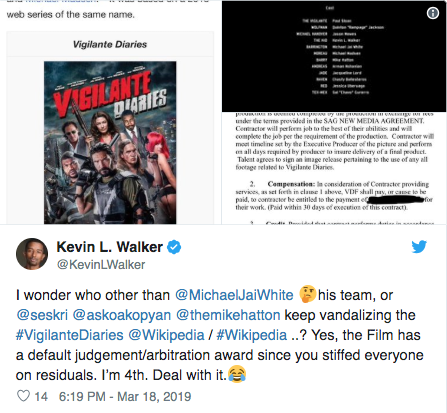Vigilante Diaries released in 2016 worldwide by Anchor Bay Entertainment starring Kevin L. Walker, Jason Mewes, Quinton ‘Rampage’ Jackson, Michael Madsen, and Michael Jai White.
The film was at least exhibited on HBO, Cinemax, STARZ, iTunes, Vudu, Youtube, Google Play, Amazon Prime, and select theaters domestically and internationally.

Since at least around February of 2018 SAG-AFTRA has been pursuing a claim on behalf of the cast, stunt performers (some who suffered injuries), and crew regarding unpaid deferred pay, unpaid stunt paid, and unpaid residuals per SAG’s bargaining agreement and New Media contracts.
the SAG New Media contracts stated that once the film is sold and/or distributed, the cast & crew that dedicated their time to the project and worked for “deferred” would be compensated for their work.
The film is reported to have at least garnered upwards of $175,000, however the producers & distributors like Lionsgate/STARZ Media LLC, Mike Hatton, Asko Akopyan, Christian Sesma, Nick Vallelonga has refused to pay the cast & crew was they are due, and years later have only dispersed $30-$45 payments to the individuals involved.
To think, had something not been said, shady producers @askoakopyan @seskri @themikehatton were going to con/stiff the entire cast and crew of #VigilanteDiaries – 2 YEARS LATER we have STILL have to arbitrate and they sent this disrespectful $45 check 😂 #oscargoldproductions 😭 pic.twitter.com/WHfRf7BfJi
— Kevin L. Walker (@KevinLWalker) October 31, 2018

Since, SAG-AFTRA has arbitrated the grievance and the arbitrator has seemingly decided 100% in favor of Kevin L. Walker, SAG-AFTRA, and the cast and crew, per a recent tweet by Walker, where he also remarked about the obvious vandalism still currently taking place on the film’s wikipedia page, where unscrupulous “wikipedia admins” continue to remove his name from the 4th billed spot in the starring cast list., despite the facts clearly proving otherwise.
I wonder who other than @MichaelJaiWhite 🤔his team, or @seskri @askoakopyan @themikehatton keep vandalizing the #VigilanteDiaries @Wikipedia / #Wikipedia ..? Yes, the Film has a default judgement/arbitration award since you stiffed everyone on residuals. I’m 4th. Deal with it.😂 pic.twitter.com/c0Uj5X1sI5
— Kevin L. Walker (@KevinLWalker) March 19, 2019
Though an arbitration award is a huge step, it isn’t the end. To get the ball rolling on enforcement through the court system, the winner of the arbitration hearing needs to “confirm” the judgment in court.

In an arbitration proceeding, an impartial third party known as the arbitrator, listens to the disputing parties and applies relevant laws to resolve the outstanding issues. Like a trial in a courtroom, the parties make opening and closing arguments, present witnesses, and provide testimony in presenting their cases. Unlike a trial in a courtroom, however, arbitration relaxes litigation formalities such as the many restrictive evidentiary rules and procedural requirements.
Arbitration proceedings have grown in popularity over recent decades.[1] People who would ordinarily be inclined to go to court to resolve disputes often discovered that an arbitration is an efficient, cost-effective, and flexible alternative to litigation.[2]
Once one side “wins” her arbitration hearing, what happens next? Well, if the other side simply capitulates and pays up or abides by the arbitrator’s decision, then there’s really no problem. However, arbitration awards often need to be enforced and enforcement can come only through the court system. To get the ball rolling on enforcement through the court system, the winner of the arbitration hearing needs to “confirm” the judgment in court. In this presentation, we’ll discuss how one party can achieve confirmation of an arbitrator’s award at both the state and federal levels.
State Court Arbitral Award Confirmation
The procedure for confirming an arbitration award is relatively straightforward and is necessary because an award cannot be enforced within the United States until an appropriate federal or state court confirms the award. While states’ processes for arbitration award confirmations differ, we will look at California’s approach because it is typical of and comparable to those of many other states.
States enact their own arbitration acts, such as the California Arbitration Act to provide the process by which state courts can confirm an award. These acts typically to arbitration awards concerning intrastate contracts, which are contracts that do not involve business activities between states. States also often maintain separate statutory rules for confirmation of awards rendered through court-ordered arbitration.[3] This law outlines confirmation of awards reached in arbitrations regarding legal controversies that were already in court before the court ordered arbitration.
A petition for confirmation of an arbitration award must be filed in a court in the county where the arbitration was held. The petition must include[4]:
- The names of all parties to the arbitration;
- The agreement to arbitrate;
- The arbitrator’s name; and
- The award and any accompanying written opinion.
When the arbitration was held outside of the state but the arbitration agreement was entered into in the state, the party seeking to confirm the award must file a petition for confirmation in the county where the parties entered into the arbitration agreement.
The process to confirm an arbitral award proceeds much faster than a regular lawsuit. This speed and efficiency is demonstrated by the fact that a party seeking to confirm can do so as soon as ten days after the arbitrator makes an award.
The other party may file a petition to vacate or correct an award, though this must be done within a relatively short time after the award is confirmed (100 days, for example, in California).
Grounds for vacating an arbitration award are severely limited. In California, for example, an arbitration award can be vacated only due to a showing of corruption, fraud, or an arbitrator’s misconduct that prejudiced one party’s rights.
Federal Court Arbitral Award Confirmation
The federal government has well-rooted policies on how an award is confirmed. The Federal Arbitration Act (“FAA”) provides guidance for the confirmation of domestic arbitration awards in federal courts.[5] The party applying for the confirmation must do so in the proper federal court within one year after the arbitrator’s decision.[6] The proper court is any court specified in the arbitration agreement. If there is no specified court location, the petition can be filed for confirmation in the district where the award was made.
When the party files a petition for confirmation, he must file the following supporting documents along with the petition[7]:
- The award: a copy of the arbitration award, which will include the findings of fact and an explanation of the basis for the award;
- The arbitration agreement: the agreement is needed as evidence that the parties agreed to arbitrate their dispute[8];
- Any papers used for additional arbitrator selection and extensions of time.
Once an arbitral award is confirmed, the judgment is docketed, which means that it has the same force and effect as any other civil judgment. In most cases, arbitration awards are confirmed and entered as judgments without adverse party opposition.
Courts are hesitant to vacate or alter arbitration awards when they are challenged. The FAA’s grounds for setting aside an award are the only ways to do so and they consist of the following cases:
1) where the award was procured by corruption, fraud, or undue means;
2) where there was evident partiality or corruption in the arbitrators, or either of them;
3) where the arbitrators were guilty of misconduct in refusing to postpone the hearing, upon sufficient cause shown, or if the arbitrators refused to hear evidence pertinent and material to the controversy; or of any other arbitrator misbehavior that prejudiced the rights of any party; or
4) where the arbitrators exceeded their powers, or executed their powers imperfectly that a final and mutual award was not made
Federal arbitration law also dictates that parties cannot agree to additional grounds to vacate an award.[9] Unless one of these four circumstances can be shown, the arbitration award will not be reversed.
Time and time again, the United States Supreme Court has respected these limited methods for vacating and arbitration award. [10] In one case, the Court reasoned that Congress passed the FAA because of a desire to confirm contracts that had arbitration clauses and to make arbitration clauses as enforceable as any other contract provision.[11]
Almost as difficult as having an arbitration award vacated, is having the award modified. The FAA provides only three grounds to modify or correct a domestic arbitration awards:
1) where there was an evident material miscalculation of figures or an evident material mistake in the description of any person, thing, or property referred to in the award;
2) where the arbitrators have awarded upon a matter not submitted to them, unless it is a matter not affecting the merits of the decision upon the matter submitted; or
3) where the award is imperfect in matter of form not affecting the merits of the controversy.
The effect of these rules on both the federal and state levels is to ensure that the process of confirming an arbitration award is streamlined, efficient and supportive of the arbitration process. Since these rules favor speedy resolutions, they continue to reinforce the idea that arbitration is a cost-effective and efficient alternative to litigation.
Given the lapse in time, the award should be confirmed any day now.
We will keep you updated as the story develops!
Anyone with a grievance or information regarding this is encouraged to contact SAG-AFTRA’s counsel Nate Hennagin.




